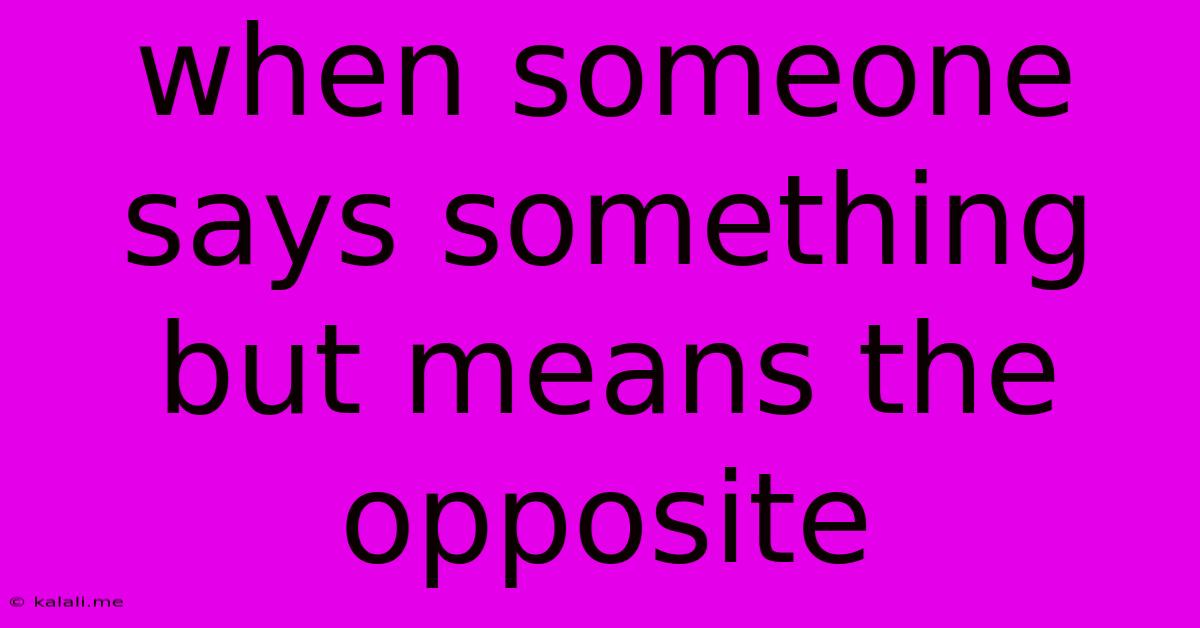When Someone Says Something But Means The Opposite
Kalali
Jun 08, 2025 · 3 min read

Table of Contents
When Words Mask Meaning: Understanding Sarcasm, Irony, and Other Forms of Verbal Irony
We've all been there. Someone says something, and the words themselves seem perfectly innocuous, even pleasant. But there's an underlying current, a subtle shift in tone, a knowing glint in the eye that reveals the speaker means the exact opposite. This fascinating linguistic phenomenon, where the literal meaning clashes with the intended meaning, encompasses several related concepts: sarcasm, irony, and other forms of verbal irony. Understanding these nuances is key to effective communication and navigating the complexities of human interaction. This article will delve into the specifics of each, providing examples to help you better grasp these subtle art forms.
What is Sarcasm?
Sarcasm is perhaps the most readily identifiable form of verbal irony. It involves saying the opposite of what you mean, typically with a mocking or contemptuous tone. The intent is often to express disapproval, criticism, or humor in a biting way. Sarcasm relies heavily on context and tone of voice; the same words delivered differently can completely change the meaning. Consider the classic example: "Oh, fantastic," said after spilling coffee all over a new shirt. The word "fantastic" is clearly not intended literally; the sarcasm is evident in the tone and the context of the situation. Key characteristics of sarcasm include:
- Negative intent: The speaker intends to convey displeasure or criticism.
- Obvious contradiction: The literal meaning directly contradicts the intended meaning.
- Tone of voice: Sarcasm is often, though not always, detectable through a sarcastic tone.
- Context is crucial: The situation heavily influences the interpretation of sarcastic remarks.
Irony: A Broader Perspective
Irony is a broader term that encompasses sarcasm. It refers to a situation or statement where the outcome or meaning is the opposite of what is expected. While sarcasm is a type of irony, irony itself can manifest in different ways:
- Verbal irony: This is where the speaker says something that contradicts their meaning, as discussed above. Sarcasm falls under this category.
- Situational irony: This occurs when the outcome of a situation is the opposite of what is expected or intended. For example, a fire station burning down is a classic example of situational irony.
- Dramatic irony: This is found in literature and theater where the audience knows something that the characters don't, creating a sense of suspense or anticipation.
Beyond Sarcasm and Irony: Other Forms of Verbal Irony
While sarcasm and irony are the most commonly used terms, other forms of verbal irony exist, such as:
- Understatement: Deliberately downplaying the significance of something, often for humorous effect. For example, describing a catastrophic event as a "minor setback."
- Overstatement (Hyperbole): Exaggerating for emphasis or humorous effect. For example, saying "I'm so hungry I could eat a horse."
Recognizing and Interpreting Verbal Irony
Successfully interpreting verbal irony requires paying close attention to several factors:
- Context: What is the situation? What has led to this statement?
- Tone of voice: Is there a hint of mockery, contempt, or amusement in the delivery?
- Body language: Do the speaker's facial expressions or gestures hint at a different meaning?
- Relationship between speaker and listener: The existing dynamic between the individuals can significantly influence the interpretation.
Mastering the art of recognizing and using verbal irony is a valuable skill in communication. It allows for nuanced expression, subtle humor, and a deeper understanding of the complex tapestry of human interaction. While it's important to be mindful of the potential for misinterpretation, skillfully employing sarcasm and irony can add richness and depth to your conversations.
Latest Posts
Latest Posts
-
Configurar Porta No Application Pool Iis
Jun 08, 2025
-
Water Coming Up Through Basement Floor After Heavy Rain
Jun 08, 2025
-
What Do You Call A Male Mistress
Jun 08, 2025
-
How Long Can I Leave My Car Running
Jun 08, 2025
-
How To Use Guy Line Tensioner
Jun 08, 2025
Related Post
Thank you for visiting our website which covers about When Someone Says Something But Means The Opposite . We hope the information provided has been useful to you. Feel free to contact us if you have any questions or need further assistance. See you next time and don't miss to bookmark.